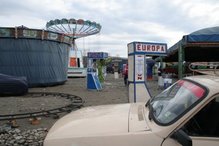On TV, the funeral of Giovanna, the story around an Italian woman (47) murdered by a Romanian rrom/gypsy (24) has dominated news reports of the last few days. Images: the grief-stricken husband is held by two friends while the coffin is moved into the church. Lots of politicians and notabilities attend the funeral service. In Bucharest, Realitatea TV has made a panel for Prayers for Giovanna, where people leave flowers, candles, and write messages on a whiteboard. Romanian officials react. Italian people make comments. The Romanian Foreign Ministry gives statements. On the outskirts of Rome bulldozers flatten the quasi-shantytowns built by Romanian rromi/gypsies. The rromi/gypsies in Italy are in distress because they may be expelled, and their dwellings destroyed. The Romanian premier accuses the Mayor of Rome of exploiting the events for his own purposes.
Populist, racist and moderate voices all shout at each other. As usual, the media does not just make the news, but is an arena for more engrained views, giving a (very specific) perspective. I think there are plenty of reasons, all not very flattering to ‘Europeans’, for which this story broke.
In Romania, discrimination against rromi/gypsies is a daily encounter. The word used in everyday speech is ‘tigan’. Never have I heard anyone use, in a non-parodyings way, any other word. Mass media (opportunistic and relatively emotional and populistic) uses a mixture. It is admitted that there are also ‘tigani cuminti’ (nice, well-behaved rromi/gypsies) who do not display any criminal behaviour, but they’re exceptions to the rule. Romanian Romanians who break laws are not criminals (except if they’re politicians), but they merely are resourceful (se descurca) or they are clever (destepti). Please note the hypocrisy inherent in this view denouncing a high degree of nationalist-exclusive sentiment-conviction.
I am routinely confronted with statements combining the following: dirty gypsies/they cannot do any work properly, they are bad craftsmen/they steal/they have made our nation a gypsy nation in Europe/they are not civilised/they refuse to work/they refuse to send their children to school/we know what it is really like to live with gypsies, not like those people in the EU who accuse us of discrimination/if we are not careful, we are going to be a minority in our own country, because the gypsies are still making children, even though they are too poor to raise them/go and have a look in X (insert village with majority of gypsies here), I was shocked, I thought this cannot be Romania, this must be Zimbabwe/………/
This type of attitude goes right across gender, age, class, and level of education.
The rrom/gypsy is, as others have pointed out too, the incarnation of a very hierarchical viewing of society, and it is pretty much equivalent with foreigner of the worst kind. You cannot get much more alien than being a gypsy.
I keep forgetting how much racism there is in large parts of any population.
The Gândul of Friday 2nd November contains an editorial by Bogdan Chirieac that renders the Romanian angle very well. This newspaper is not a tabloid. I read this, I understand all the words, and yet, I think, this is weird. Back to the rhetoric that I still strive to understand. The article in question is entitled ‘The punishment of Romania for Rrominia?’
I’ll translate it entirely.
“A raping criminal, of Romanian citizenship, of rrom ethnicity, has horrified Italy again. To the horrible crime against a woman of 47 years of age, committed by this man, can be added other frightening crimes committed in the last months of other Romanian citizens of rrom ethnicity. Rome’s government, assembled in an emergency meeting, as happens only in the case of war or natural disaster, has taken the firm decision to expel foreigners. The word ‘Romanian’ is not pronounced in the decree. But three quarters of arrests in Rome this year – 2700 persons – are Romanian citizens. All the Romanians commit 37 percent of thefts of Italy and over 15 percent of the murders [rendered as: asasinate]. The Italians, and, along with them, the French, Spanish, British, German, have every right to be angry. In their home, citizens of an Eastern state admitted at the limit into the European community affect their way of life in a concerning way: they steal from them, they plunder them, they kill them.
The Europeans have every right to be angry, but not the right of making the mistake of condemning the Romanian people [popor= people] in its entirety, for the mode of life of rrom minorities. The preservation of the rights of minorities, the encouragement of their respective languages and cultures are European values. Romania was judged harshly during the entire process of EU integration, for the fact that it discriminates against the rromi, that it does not respect their laws and traditions. Today, Europe is confronted with the problems of the rromi that were, until now, hidden from view. In the name of political correctness, Europe hesitates to describe things as they are. The gypsies (tiganii) are nomadic populations throughout Europe, not only in Romania. The way of life of some of them severely affects the European model. Stealing is learnt at the same time as walking, the children are not let to go to school, the little girls are married and even give birth when they are 10-11 years old. The gypsies live in tents, horse carriages, and, more modern, in caravans. There is a parallel justice system with an immediate carrying out of the sentence. The social integration is, as such, refused under all aspects in relation to education, family planning, medical assistance, professional development. These are the traditions of some gypsy populations of Europe. Does the EU want to preserve this way of life? If yes, then the public opinion needs to be prepared and informed in this direction. If not, the solution is not, under no circumstances, neither the condemnation of the Romanian people, nor the deportation or isolation of gypsies at the margins of the cities, as has been proposed by Mister Gigi Becali [Party of the New Generation and owner of Steaua Bucharest, a shepherd who got fantastically rich after 1990, known for his populist ‘policies’ consisting largely in money donations to deprived people to catch votes and for his lack of a programme] in Romania. The solution can only be found in the passing from an NGO policy priority to a European strategy, similar to the process of integration of the other minorities of the EU. The results will not be, however, spectacular or fast. In France, the integration of Maghreb minorities is a half-failure. The brother of the French Justice minister, Mrs Rachida Dati, of Moroccan origin, are or have been in prison. In the last years, the ‘garbage’, as Sarkozy has called them, of the peripheries of Paris have lit up, in a revolt, over 10000 cars. In strong and rigorous Germany, the integration of the Turks has not happened even after 40 years. The Turkish quartier of modern and cosmopolitan Berlin looks like an ill-famed suburb of Istanbul, and a lot of its inhabitants do not speak German, even if they were born and raised here.
The simple truths known by any police officer of Europe are not told by the politicians except by whispering and in the absence of TV cameras. President Basescu, for whom gypsies are ‘stinking’, does not have the courage to tell Europe that in the nomad tribes having a bath is not a normal tradition, and that people smear tallow over their bodies for protection from illnesses and charms. The Romanian people can be called thieving, raping and criminal, but this will not bring peace and security to the streets of Rome, Paris or Madrid. This is only possible by the recognition of the problems of the gypsies and their solving through a European way [pe cale europeana].”
A lot could be said about this piece. I do not question that integration is a delicate and difficult topic, but I am personally concerned with the increasingly restricting legislation as far as migrants are concerned. I think as far as internal migration within the EU is concerned, it is wrong to impose restrictions. I see it as a consequence of an increase of xenophobia, in an increasingly unstable economic environment, and, let me put it this way, I might be left-wing, but not entirely opposed to necessary reforms as far as work is concerned, as long as certain conditions are fulfilled. But this is an entire discussion for which there exist better arenas than this post.
Let me keep the comments brief, all in the line of ‘deux poids, deux measures’ really…
- Note the exhortation not to confuse Romanians and gypsies, juxtaposed with the conflation of Europe and the EU
- Note the conflation of EU accession and integration in the case of Romanians, and the rhetorically empty use of ‘integration’ meaning assimilation
- Note the value-laden, and spatially differentiating descriptions of the progressive West and the backward, unmodern East (epitomised by the Turks). Note, in the same vein, the juxtaposition of the EU as a torchlight of progressiveness, and that will solve Romania’s national problems as well as every other country’s
- ‘The solution can only be found in the passing from an NGO policy priority to a European strategy, similar to the process of integration of the other minorities of the EU’ – what on earth does he want to say? As far as I
- Note how the Europeans are, collectively, angry at the rromi
- There is a lurking feeling that it is the gypsies’/Turkish immigrants/Maghrebians fault that they are at least poorer than average (note that this does not enter the discussion), and that it is because of inherent deficiencies (e.g. weird, unprogressive traditions)
- As usual, I have a high level of mistrust in the way in which the Romanian press uses statistics, and gives sometimes distorted information that results from lack of rigour and/or overgeneralisation, e.g. the bit where gypsies are universally characterised as living in horse carriages, marrying off their children early, etc.
- The non-integration of gypsies is viewed as a refusal, but the engrained, interiorised views on gypsies (at least in Romania) do not help ‘integration’ in the best possible way because even key people like teachers or priests have these kinds of views…
- It does raise questions about certain aspects of political correctness that may, at first, be used to gloss something that might be unchanged in practice, but that might change over time, just by giving it a new frame and vocabulary, attitudes to follow shortly. In other words, Wilde’s phrase that the truth is rarely pure and never simple holds true, and I believe that even while there may be proportionally more gypsy criminals in Italy, I do not think that someone has done the statistics how many of the Romanians citizens arrested by Italian police were, actually, ‘of rrom ethnicity’. I have a hard time imagining Italian carabinieri asking the suspect, ‘please fill in this ethnicity questionnaire, thank you very much, Sir’. And I find it funny how police officers are transformed, suddenly, in a country where the police force is known for their lingering corruption and violence, in the keepers of the truth
- Hopefully the discussion will mature a little…
My apologies for exceeding normative post word count.














